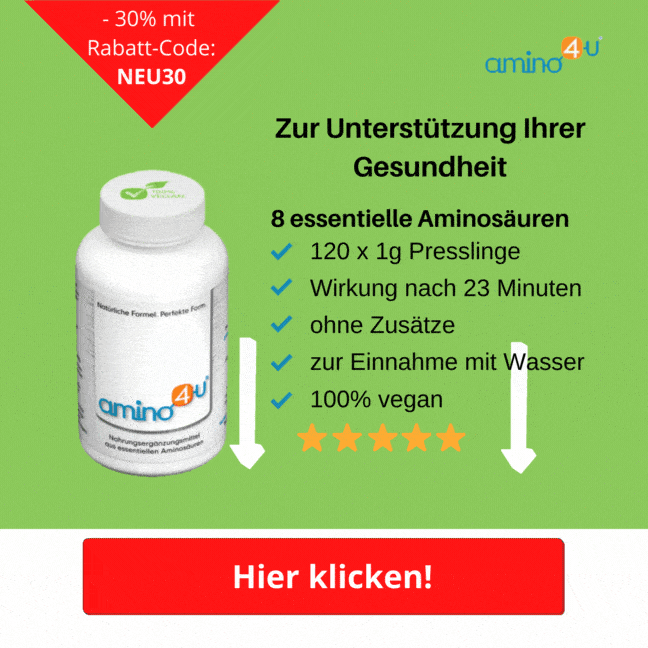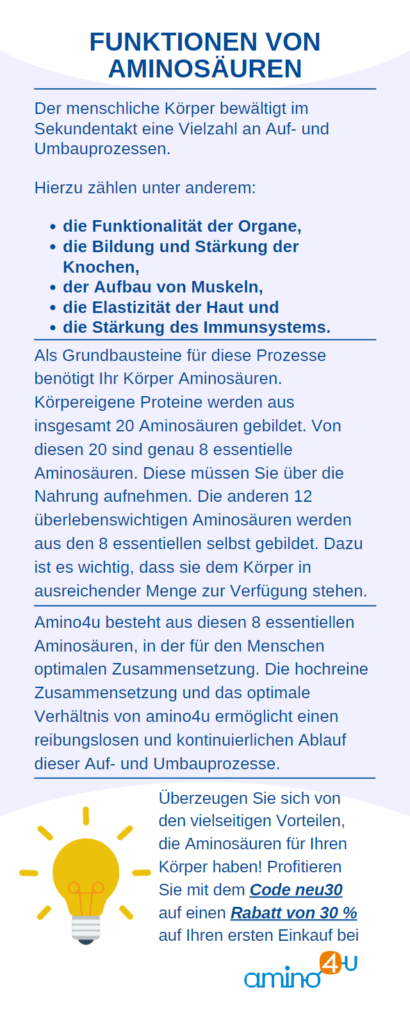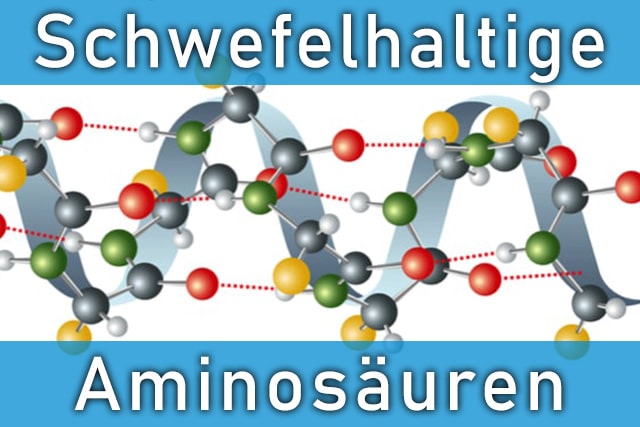Are you concerned about your supply of proteins and amino acids? Are you particularly interested in which foods allow you to naturally absorb one or another amino acid when you eat? We have put together the most important information on this topic for you.
You will also find out in which phases of life you may have a higher need for protein and protein building blocks.
The importance of amino acids for the human organism
Amino acids are also known as protein or protein building blocks. They form chains of different lengths and thus proteins and peptides. A variety of physical functions require
protein building blocks . Among other things
- they are the basis for all body tissues.
- They are made up of various hormones, messenger substances and neurotransmitters.
- You influence important physical areas, such as the immune system and psychological balance.
Protein is also one of the 3 macronutrients alongside fats and carbohydrates. It is also characteristic of protein and protein building blocks that they are constantly subject to conversion processes. That is why they play a leading role in a wide variety of
metabolic functions , including in the liver. In various scientific studies, the
functions and effects (including the
amino acid side effects ) of different protein building blocks in the human body were examined in more detail.
For example, it was also recognized for individual building blocks that...
can.
But how can you absorb sufficient amounts of the various
protein building blocks , or rather how does your body form the most important protein building blocks itself and what is the
effect of the amino acids ?

Amino acids overview: Sources of essential protein building blocks
The
essential protein building blocks are of particular importance in the human organism. These are 8 representatives from the superordinate group: the
proteinogenic amino acids . Proteinogen means “
tissue-forming ”. Here we are dealing with the protein building blocks, which are indispensable as building materials for all body tissues. Below you will find a
list of amino acids .
These essential protein building blocks...
- Threonine
- Tryptophan
- Valine
- Leucine
- Isoleucine
- Lysine
- Methionine
- Phenylanaline
The human organism cannot produce it itself.
According to the American scientist Professor Luca-Moretti,
essential amino acids form the human
amino acid pattern . Luca-Moretti developed the theory that all mammals - including humans - have their own amino acid pattern. This profile is formed from protein building blocks that are particularly easy to use for the respective organism.
In humans, over 99% of the essential protein building blocks are usable. They can be almost completely converted into the body's own protein.
According to Prof. Luca-Moretti, all of these building blocks should be available to the organism at the same time and in specific quantities. This is the only way that all functional areas can be served and the protein metabolism works smoothly.
Other protein building blocks such as arginine or tyrosine are
semi-essential amino acids . These building blocks are essential in special phases of life such as infancy or youth. In other phases of life, they are formed by the body itself from other protein building blocks.
Natural amino acids foods for vegetarians and vegans
Not only with regard to the amino acid pattern, vegetarians and especially vegans can potentially develop a deficiency in essential protein building blocks. Plant-based foods do not regularly contain all the essential
amino acids in sufficient quantities. They are usually only contained in animal foods.
Almost all types of fish and meat are
natural sources of amino acids . As a rule, they contain all of the essential building blocks at the same time.
That's why strict vegetarians and vegans need to be very well informed about the respective levels of essential protein building blocks in individual foods. You can then achieve a better, although not necessarily ideal, supply of protein building blocks through certain combinations of plant-based foods.
Basically, it is not just one
nutrient source that ensures the supply of protein building blocks. Combinations and variations of the different foods are necessary that cover the needs as a whole.
Sources of other protein building blocks
Even though building blocks such as arginine or tyrosine can mainly be produced by the human organism itself, they are very important. Tyrosine, for example, is the basis for the synthesis of an indispensable thyroid hormone. Arginine plays a key role in the human body's nitrogen cycle. It also affects
vascular tension and therefore, among other things, blood pressure.
A deficiency in both essential and other
protein building blocks can manifest itself in different ways. These include diffuse signs of tiredness and exhaustion, as well as the breakdown of the body's own protein. You can't be sure that your body is actually able to produce all non-essential protein building blocks itself. For this formation, it also needs other substances and other protein building blocks.
When it comes to the supply of substances that support protein formation, certain foods are important. It is important to eat foods that are rich in certain micronutrients and enzymes.

Essential components in food for the formation of protein building blocks
Enzymes are substances that help initiate certain reactions and processes in the human body. They are also partly supplied with food and partly formed from other substances produced by the body.
Most
vitamins must be obtained through food.
Enzymes and vitamins are sometimes indispensable so that other protein building blocks can be formed from protein building blocks. This is especially true for various vitamins from the vitamin B family. The demands on a supply of high-quality
food are therefore relatively high if you want to ensure a functioning protein metabolism at all times.
Meet your needs through food - amino acids foods
The
World Health Organization (WHO) has established daily requirements for the essential protein building blocks. According to this, you should eat per kilogram of body weight per day with your diet
- Threonine 15 mg
- Tryptophan 4 mg
- Valine 26 mg
- Leucine 39 mg
- Isoleucine 20 mg
- Lysine 30 mg
- Methionine 15 mg
- Phenylanaline 25 mg
to record.
The
requirement values can fluctuate in different life situations; some values, such as leucine, increase fivefold or double like lysine.
Circumstances that influence the need values include illnesses, stress or age. To get a feel for these values, the content of two foods for essential protein building blocks is shown below.
Amino acids foods - 2 examples
Broccoli : The following
levels of protein building blocks could be consumed per 100 grams:
- Threonine 111 mg
- Tryptophan 32 mg
- Valine 151 mg
- Leucine 151 mg
- Isoleucine 123 mg
- Lysine 148 mg
- Methionine 41 mg
- Phenylanaline 114 mg
The values refer to freshly cooked broccoli, which is consumed immediately.
At first glance, these values seem impressive. But they still say a lot about whether your body will actually absorb
protein building blocks of this size.
On the one hand, the amino acids are integrated into the
food and therefore have to be extracted using energy. This is more difficult with plant-based foods than with animal foods. The prerequisite for this is that all metabolic processes in the body function properly.
This is not always the case, especially in advanced age. What amounts of protein building blocks are actually available to the body in the end is a very individual question. Preparing and storing ready-cooked food also plays a role.
Overall, the supply of one or another amino acid can be more limited with
plant-based foods . This is shown by the example of the methionine content. In the worst case scenario, a larger proportion of the
amino acid is not freely available to the body when consumed. The organism then has to assemble the protein building blocks from different nutrient sources.
 Beef fillet
Beef fillet
The following
values for the protein building blocks must be achieved per 100 grams of meat:
- Threonine 969 mg
- Tryptophan 242 mg
- Valine 1256 mg
- Leucine 1783 mg
- Isoleucine 1145 mg
- Lysine 1922 mg
- Methionine 550 mg
- Phenylanaline 902 mg
Can a supplement meaningfully complement your diet?
In certain life situations, such as under stress, illness or in advanced age, the need for protein building blocks increases. Here, supplementation can support the supply. High-quality
nutritional supplements with protein building blocks have various advantages. They supply the body with freely available protein building blocks.
If this happens, for example, in liquid form, the building blocks do not have to be removed from other foods by the body itself. They can be used by the organism in around 20-30 minutes.
Especially when it comes to the supply of essential building blocks, nutritional supplements can make a valuable contribution to the supply. Most
foods contain protein building blocks. However, there is no guarantee that an amino acid from a natural nutrient source can be fully processed by the organism.
Natural
foods also differ significantly in their value when it comes to protein building blocks. If you have an additional need for a single amino acid such as arginine, a
nutritional supplement, for example amino4u, is a good way to cover this additional requirement.


 Beef fillet
The following values for the protein building blocks must be achieved per 100 grams of meat:
Beef fillet
The following values for the protein building blocks must be achieved per 100 grams of meat:



